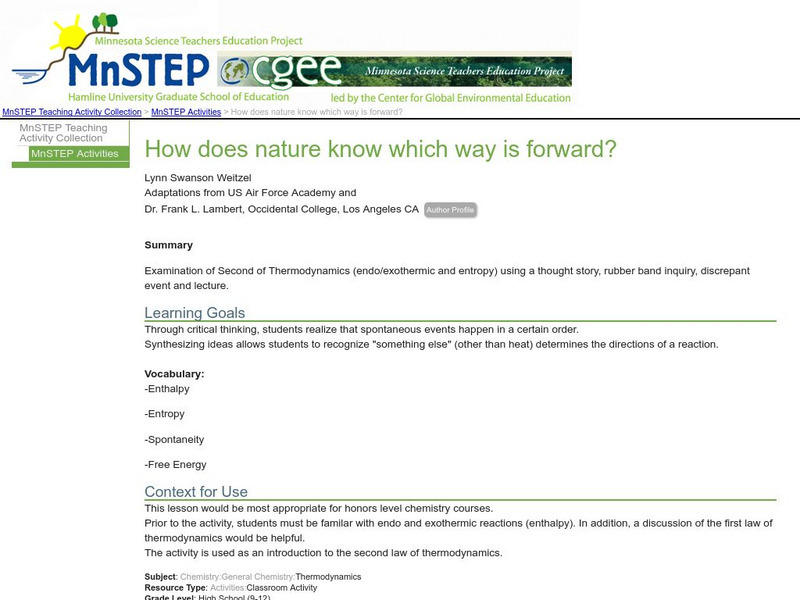Curated OER
2002 U.S. National Chemistry Olympiad National Exam - Part I
As to be expected from the American Chemical Society Olympiad Examinations Task Force, this 60-question test tops the charts in terms of excellence. It consists entirely of multiple choice questions designed to assess a year's worth of...
Teach Engineering
Efficiency of a Water Heating System
Tired of waiting for hot water? Groups of three determine the efficiency of an electric water-heating device. They calculate the amount of energy it takes to heat the water and the theoretical amount of energy required to heat the water....
Curated OER
WS 7.5 Thermodynamics Concepts and Vocabulary
In this thermodynamics learning exercise, students fill in the blanks with terms related to specific heat, calorimetry, phase changes, enthalpy, entropy and free energy.
Curated OER
Entropy and Free Energy
In this entropy learning exercise, students define entropy and determine if reactions are exothermic or would occur spontaneously. This learning exercise has 10 problems to solve.
Curated OER
Thermodynamics
In this thermodynamics worksheet, students calculate the change of entropy and standard free energy change for given reactions. Students write expressions for the thermodynamic equilibrium constants for reactions. This worksheet has 10...
Curated OER
Chemical Equilibrium
In this chemical reaction worksheet, young scholars define equilibrium, determine what affects the progress of a reaction, and compare and contrast entropy and enthalpy. This worksheet has 5 fill in the blank, 5 short answer, and 16...
Curated OER
Reaction rates and Equilibrium
Students listen to a lecture on the collision theory. They discuss the reactant and product changes during a chemical reaction. Students are taught the factors affecting reaction rates. They complete a lab on entropy, heat and free...
Science Education Resource Center at Carleton College
Serc: How Does Nature Know Which Way Is Forward?
Through critical thinking, students realize that spontaneous events happen in a certain order. This activity presents an examination of the Second Law of Thermodynamics using a thought story, rubber band inquiry, discrepant event and...
Other
Nmsea: Electrolysis: Obtaining Hydrogen From Water
The New Mexico Solar Energy Association provides an article entitled, "Electrolysis: obtaining hydrogen from water - the basis for a solar-hydrogen economy". The article is medium size in length with pictures and charts throughout to help.










